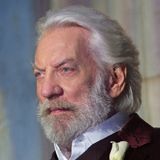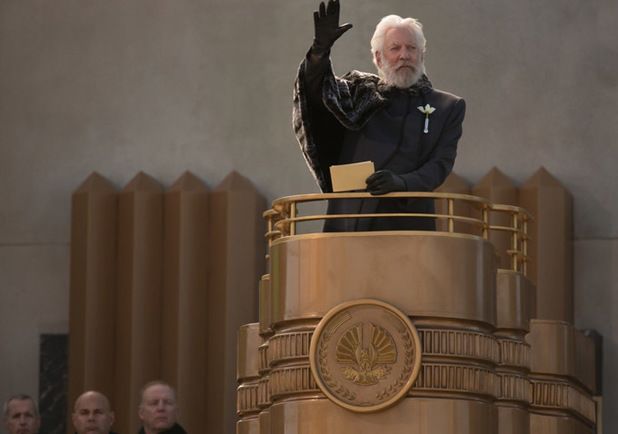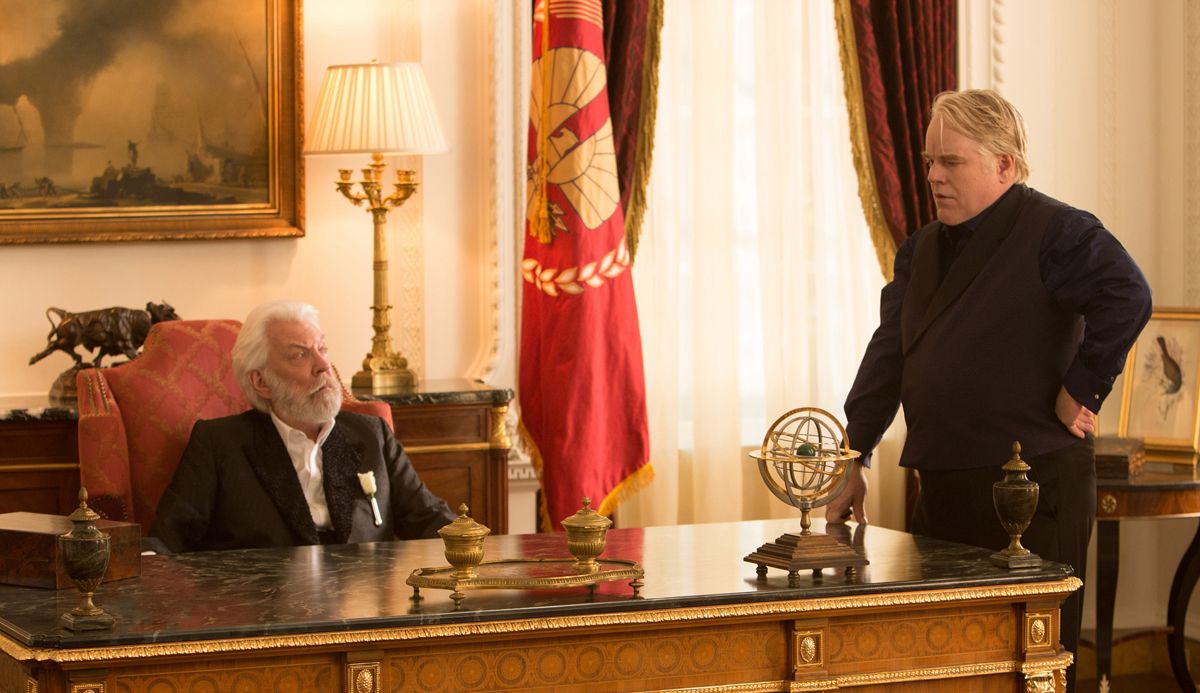Actors are always called upon to know their characters inside and out, but in the case of The Hunger Games: Catching Fire’s President Coriolanus Snow, Donald Sutherland not only defines him, but defines the world around him.
Playing the tyrannical ruler who becomes aware of the unrest that Hunger Games victor Katniss Everdeen (Jennifer Lawrence) has unleashed in Panem’s citizens, Sutherland combines the theatricality of Suzanne Collins’ sci-fi world with the sociopolitical upheavals of our own, helping to create a startling commentary on our own obsessions with celebrity culture and the way in which that obsession anesthetizes people from paying attention to matters of actual significance.
Sutherland sat down with Spinoff Online at the recent Los Angeles press day for Catching Fire, where the cantankerous actor deconstructed the complex political context from which President Snow emerged. Additionally, he talked about his own feelings about the character – and how important they are to playing him effectively – as well as about his hopes that entertainment like The Hunger Games will “catalyze, to energize” the youth of today.
Spinoff Online: You have such a clear understanding of President Snow. But how important is it for you to care or identify with him in order to play him?
Donald Sutherland: Well, certainly you don’t have to identify with him. Um, and I’ve always cared for whatever character I’m playing. But it’s not so much that I care about the character – and it sounds like such an awful thing to say, but they care for themselves. The character lives inside me. (pauses) See, this is awful – it sounds like such crap. But it’s true, actually. I never went to see movies that I did; I still haven’t seen Klute, for example, because until Six Degrees of Separation, every time -- I would go see rushes. That was easy. I could use it, I could go talk to the director. But whenever I went to see a movie, unless it was a good distance away, the character living inside me, they would cut different things, and that character would suffer greatly. And I would go nuts. I said to Robert Redford, “I don’t want to see Ordinary People,” but he insisted. And he had to watch me crawl through people’s legs on my hands and knees to get out of the cinema 10 minutes in.
Have you watched Catching Fire, then?
This? Oh, yes. I [reached a comfort watching my movies] on Six Degrees of Separation. I was with Fred Schepisi. I didn’t go to see it, but my son Kiefer came out of the movie and said, “Dad, this is stupid – you’ve got to go see that.” So I went and saw it and I was OK, and I’ve been pretty much OK ever since then. In other words, I grew up when I was about 65.
Do you look at him as a person who had the right ideals but was misguided, and is now too entrenched to see right from wrong, or was he always ruthlessly ambitious, and these are the repercussions of his actions?
He was ruthlessly ambitious. Yeah. You don’t poison yourself unless you are. But look at this city. Look at Ted Cruz. There’s so many people whose ambition is so [misguided].
RELATED: Star Jennifer Lawrence discusses Catching Fire
How do you look at his evolution? Because he’s so comfortable in the first film, but Katniss’ influence has sort of infected the Capitol – so much so that his granddaughter wants to follow in her footsteps.
His granddaughter doesn’t understand. But you just understand how it can suddenly become not a political activity, but a fashionable activity. I mean, revolution as a fashion is often pretty popular, and people get caught up. There are very few Germans who would have instigated Nazism, or who would have thought up the idea of concentration camps, but they all en masse, because the mob is an extraordinary thing, ended up going with it. When you go to the cinema and you’re part of an audience, you don’t think like yourself. You think like a piece, a part of that mass. So for him, he realizes more and more how extraordinarily difficult and complicated Katniss Everdeen is, and it becomes a game, a game of chess. It’s wonderful, and his end, if it were to happen that he could convince her to come over to his side, she would succeed him – she would be his successor. Seneca Crane was supposed to be, and he was just supposed to eliminate her, or Peeta, one of them, but he got sentimental, and he had to be removed.
How fully defined was President Snow in The Hunger Games, and how much work did you have to do to come back and develop him further?
I don’t think anything. I just think he’s there, and I’m sure Jennifer would say the same thing. He’s there, he’s alive, and he’s beautifully written. In the first one, I read the script, and I wasn’t supposed to have the script, but my agent said, “This is a good script – read it.” I wasn’t offered the part or anything, but I read it and I was blown away. I had not read the book – I didn’t even know about the books. And I write long letters. There was a famous writer who wrote a long letter to someone and apologized at the end of it and said, “I’m sorry this is so long, I didn’t have time to make it shorter” – because it requires thinking and editing. But I sent a letter to my agent, as I do normally when they send me a script, and it went into the nature of fascism and the nature of totalitarianism and the nature of an oligarchy for the privileged or the 1 percent, and how it mirrored our society, and how we had a young population that had been dormant, certainly, for 30 years. And it was my hope that a film like this, or a series like this, would catalyze them, would energize them. The president had two or three lines at that time, and I said, “I would love to be a part of it.”
So I guess they showed my letter to Gary [Ross, director of The Hunger Games], and he took me on and then we had a lot of talk, and he wrote those three scenes in the rose garden. And those defined the character – they were poetry. So succinct, so economic. And he’s just clear-headed, pragmatic, really smart and old, and he knows that his life is nearly over. He needs to have a successor, he needs to protect his country. And like Lenin, Lenin said to his soldiers, “Don’t go in the street and shoot somebody who’s bad, shoot somebody who’s completely and utterly innocent, and that will terrorize the population into submission.” He’s tyrannical in that sense, and he has the rose because his mouth is so full of blood, because he poisoned his competitors – and so the evidence wouldn’t point to him, he poisoned himself too. Not enough to kill himself, but so it was in his system so he could say, “not me.” So when I came to Catching Fire and Francis [Lawrence, the director], what he had done was so elegant, just really beautiful. And once again I would write long letters, because I read them the other day, saying to Francis, okay, I think this needs to happen and this needs to happen, and he responded. It was a wonderful exchange.
Watching the film, I was reminded of the notion, “There’s nothing more powerful than an idea whose time has come.”
Yeah, exactly. And nothing more powerful than the genius who can transport that idea – like Christ, like Joan of Arc, and like Katniss Everdeen.
Ultimately, is he a character who you believe could be redeemed – meaning within this world?
I don’t think redemption is a part of the process. I don’t think he sees that he’s in a place which is redeemable. I think he thinks he’s there. I think he thinks everyone else has to be redeemed.
The Hunger Games: Catching Fire opens Friday nationwide.



